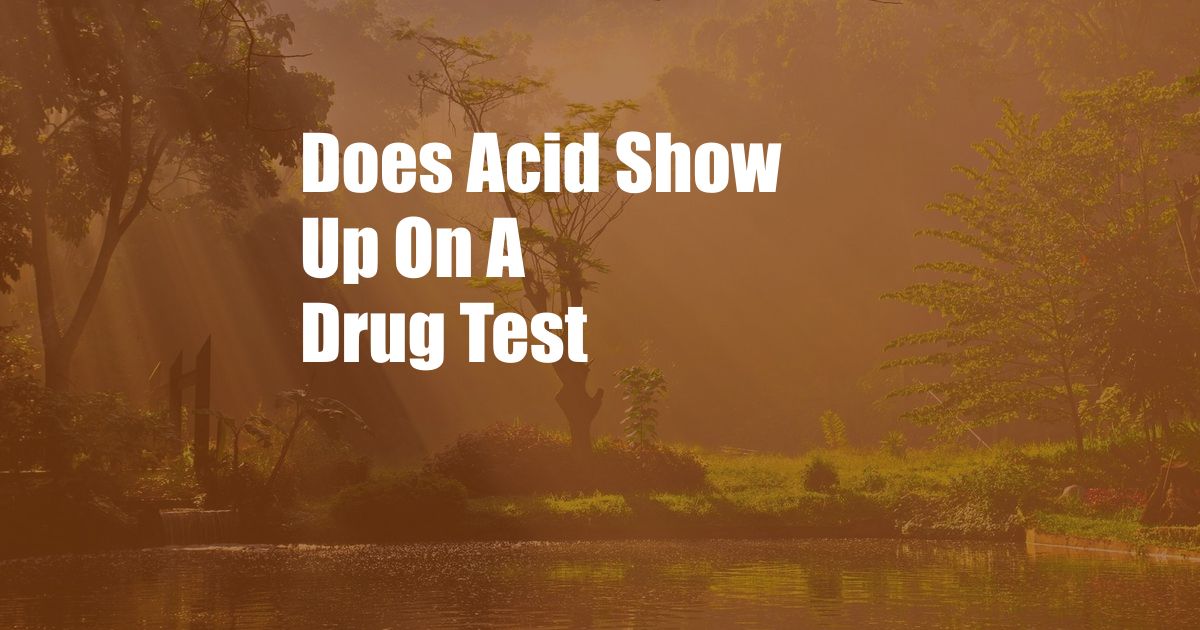
Does Acid Show Up on a Drug Test?
In a moment of youthful exuberance and curiosity, I found myself amidst a group of friends, drawn by the allure of a mind-bending experience. Little did I know that my decision to partake in LSD, commonly known as acid, would leave an imprint not just on my consciousness but potentially on my future as well. The looming question of whether this psychedelic escapade would cast a shadow on my reputation or hinder my opportunities hung heavy in my mind. To unravel the complexities surrounding this inquiry, let’s delve into the realm of drug testing and its ability to detect the presence of LSD.
Acid: A Brief Overview
LSD, short for lysergic acid diethylamide, is a potent hallucinogen that has captivated and perplexed humankind for decades. Derived from the ergot fungus that infects rye, LSD was first synthesized by Swiss chemist Albert Hofmann in 1938. Its effects can range from heightened sensory perception and vivid hallucinations to altered states of consciousness and profound spiritual experiences.
Drug Testing and Acid Detection
Drug testing has become an integral part of various industries, from workplaces to sports organizations. These tests analyze biological samples, such as urine, blood, or hair, to detect the presence of illicit substances or their metabolites. However, the detection window for LSD is relatively short, and the substance itself is not easily detectable in standard drug tests.
The metabolites of LSD, which are the byproducts of its breakdown in the body, can be detected in urine for up to 12 hours after ingestion. However, the concentration of these metabolites decreases rapidly over time, making detection beyond this window unlikely. Blood tests for LSD are even less reliable, as the substance is quickly eliminated from the bloodstream. Hair follicle tests, which can detect drug use up to several months after ingestion, are not commonly used for LSD detection due to its low concentration in hair.
Current Trends and Developments in LSD Detection
Recent advancements in analytical techniques have led to the development of more sensitive LSD detection methods. Liquid chromatography-mass spectrometry (LC-MS) is a sophisticated technique that can identify and quantify LSD in various biological samples with high accuracy. However, these methods are not yet widely available or cost-effective for routine drug testing purposes.
Researchers are also exploring the development of non-invasive testing methods, such as saliva testing, for LSD detection. However, these methods are still in their early stages of development and require further validation before they can be considered reliable for forensic use.
Tips and Expert Advice for Avoiding LSD Detection
While the detection window for LSD is relatively short, there are certain measures you can take to minimize the risk of a positive drug test result:
1. Abstain from LSD Use: The most effective way to avoid detection is to abstain from LSD use altogether.
2. Allow Ample Time for Elimination: If you do use LSD, allow sufficient time for its metabolites to be eliminated from your system before undergoing a drug test. This typically means waiting at least 12 hours after ingestion.
3. Stay Hydrated: Drinking plenty of fluids can help flush LSD metabolites from your body more quickly.
4. Use Detox Products: There are various detox products available that claim to accelerate the elimination of LSD from the body. However, the effectiveness of these products is questionable, and they should be used with caution.
Frequently Asked Questions
Q: Can I pass a drug test if I use LSD just once?
A: Yes, it is possible to pass a drug test if you use LSD only once, provided you allow enough time for its metabolites to be eliminated from your system.
Q: How long does it take for LSD to show up on a drug test?
A: LSD metabolites can be detected in urine up to 12 hours after ingestion. Blood tests are less reliable, and hair follicle tests are not typically used for LSD detection.
Q: Can I avoid LSD detection by using synthetic urine?
A: It is not advisable to use synthetic urine to avoid LSD detection, as this method can be easily detected by drug testing labs.
Q: What happens if I fail a drug test for LSD?
A: The consequences of failing a drug test for LSD can vary depending on the context of the test. In workplace settings, it may result in disciplinary action or termination of employment. In sports, it may lead to disqualification or suspension.
Conclusion
While LSD is not easily detectable in standard drug tests, it is important to remember that drug testing methodologies are constantly evolving. To avoid any potential repercussions, it is always best to refrain from using illicit substances. If you have concerns about whether LSD may show up on a drug test, it is advisable to consult with a healthcare professional or drug testing expert for guidance.
Are you interested in learning more about drug testing and its implications? Let us know in the comments below.